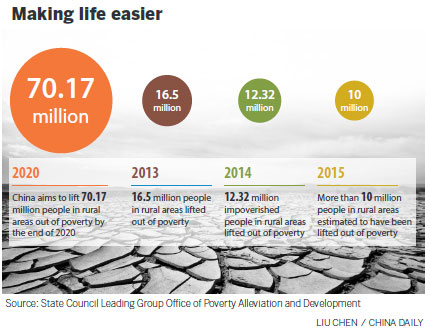|
Underprivileged children receive winter clothing at an event sponsored by local enterprises in Fuyang, Anhui province, on Jan 10. Wang Biao / for China Daily |
New measures carried out as government seeks to end hardship for 70 million people by 2020
China will stage its largest annual political and legislative events - the "two sessions" - starting on March 3.
China Daily takes a close look at a series of likely hot topics and catchphrases during the sessions.
Today's catchphrase - Precise Poverty Alleviation: This basic concept, aimed at designing and guiding poverty relief policies, was introduced by the central government in late 2013. It sets precise targets for projects, the use of capital, and for end results to find the best solutions to eradicate poverty. Based on this guidance, the government compiled a national database to better analyze the number of people living in poverty. More precision projects have been arranged, money for poverty alleviation reallocated more effectively, and accomplishments seen more clearly.
Meng Fansheng and his wife, who are both in their 60s and have health problems, used to live a meager existence in Changfeng county, Anhui province.
Because of poor health, the couple are unable to work.
Apart from a government allowance, they lived mainly on land transfer rent, and the family's annual net income was about 1,800 yuan ($293).
But their living standards improved greatly in 2014, when a photovoltaic generator was installed in their house for free by the local government as part of a municipal project to expand the distribution of solar power panels to help alleviate poverty in rural areas.
The program has not only given households free energy supplies, but has allowed them to sell surplus energy to the power grid.
"We earn about 2,500 yuan each year, which is quite a big sum for our family," Meng said.
The money is paid to him at the end of each year through his bank account, which was set up by the municipal government to prevent corruption among community officials.
This is just one example of a local government exploring precise methods to alleviate poverty.
On several occasions, China's top leaders have stressed that poverty alleviation is an important task in the country's 13th Five-Year Plan (2016-20).
In February, President Xi Jinping highlighted rural poverty relief when he made a pre-Spring Festival visit to Jinggangshan in Jiangxi province.
"Measures and work to alleviate and eliminate poverty must be precise. Policies should be made according to the (needs of) households and individuals," Xi said.
To lift 70 million people out of poverty by 2020, more precise measures are being carried out.
Liu Yongfu, director of the State Council Leading Group Office of Poverty Alleviation and Development, said, "We need to reform current thinking and methods, change blanket and all-inclusive policies to more-targeted policies and help the poor population to develop on their own.
"We have to change the assessment focus from GDP figures to achieving poverty alleviation, and solve a number of issues, including who to support, how to conduct poverty alleviation efforts and how to deal with exiting from poverty."
China has completed the identification and registration of the poor population nationwide, identifying 128,000 impoverished villages, 30 million poor families and 70 million people.
In December, the country's blueprint to tackle poverty was released, giving specific instructions for poverty reduction in the next five years.
The blueprint states, "The goal will be the most arduous task on China's path toward building a moderately prosperous society."
There should be ways to ensure that poor people in rural areas have access to food, clothing, basic education, medical care and safe homes by 2020, according to the document.
Other government bodies, including education and financial departments, are required to join the campaign.
Xiang Deping, director of Wuhan University's China Poverty Alleviation Development Academy, said, "It is important to improve education quality in impoverished regions to avoid chronic poverty."
The government will improve financial policies and services to enable more impoverished farmers to obtain loans for business start ups.

